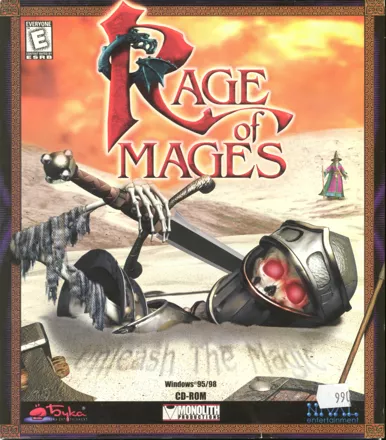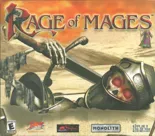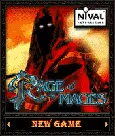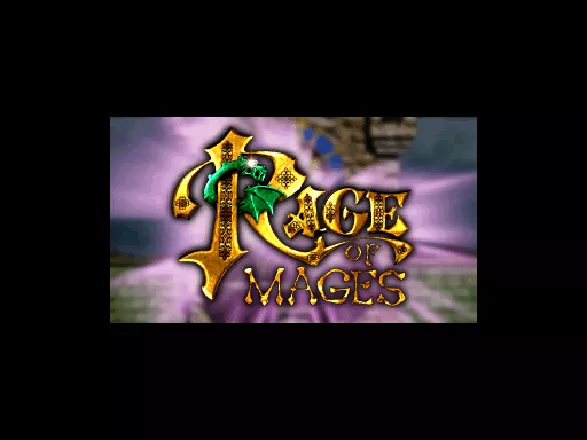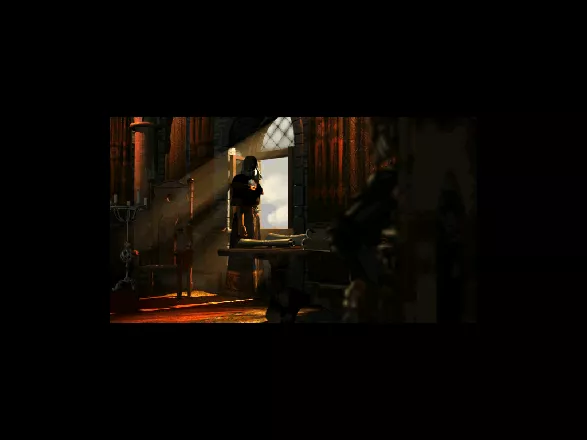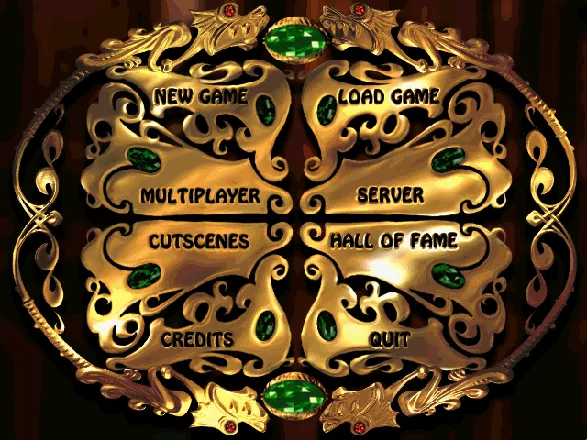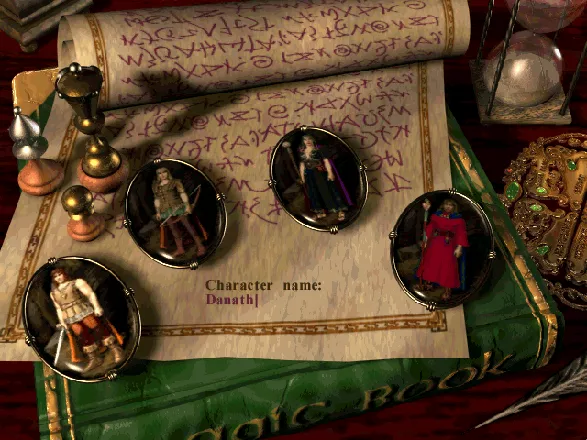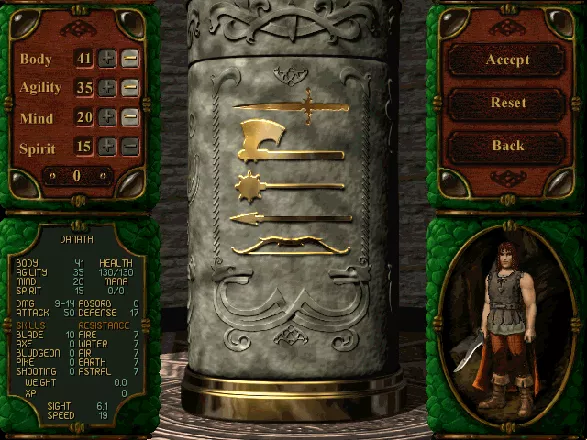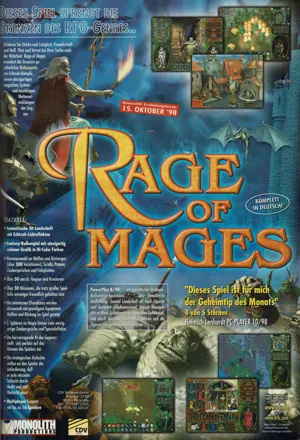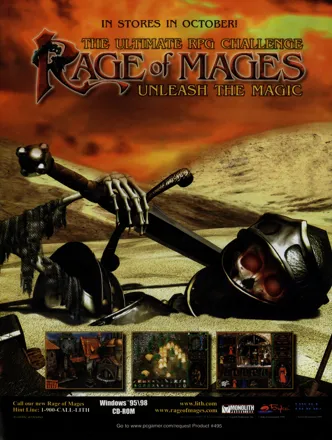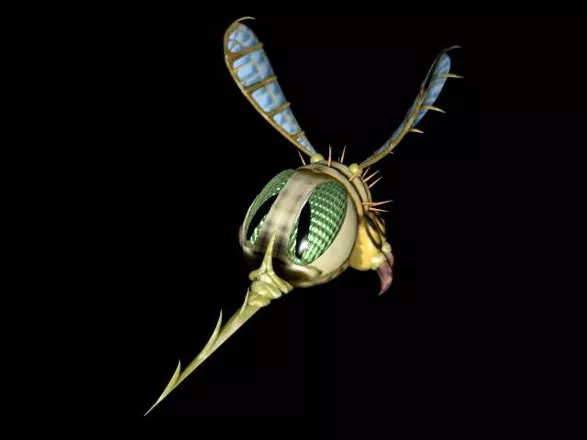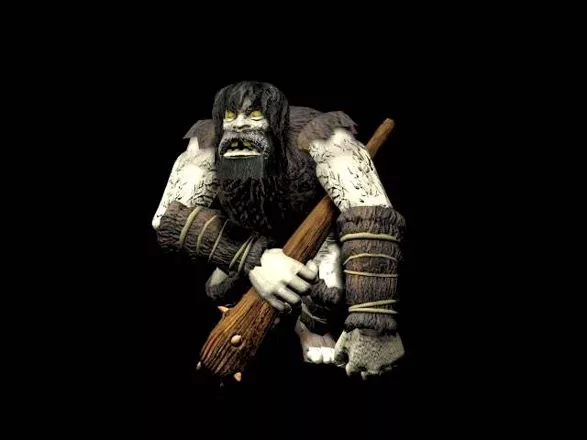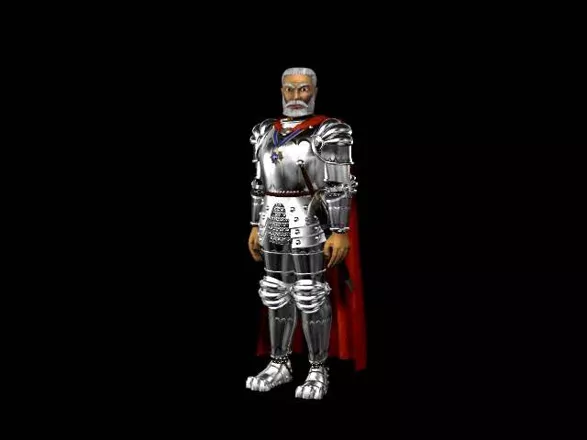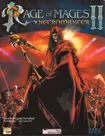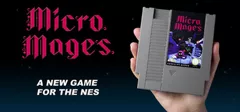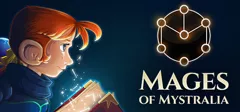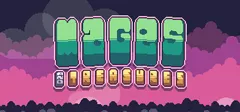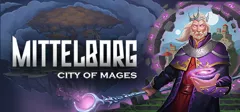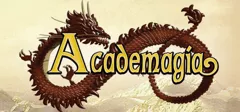Description official descriptions
Rage of Mages is an isometric role-playing game, in which the main character and his companions must journey through the world of Kania, on a quest to find a magical weapon that will break the cycle of war. The player generates the protagonist by making him either a Mage or a Fighter, each with their own skills and disciplines that may involve weapon proficiencies, elemental spells and resistance to them, etc. The player also allocates points into the four main attributes - Body, Agility, Mind, and Spirit. Over the course of the game other characters will join the party. NPCs can also be hired to tackle some of the more difficult missions. Combat is done in real time and relies on tactical preparations and planning.
Spellings
- Аллоды: Печать тайны - Russian spelling
Groups +
Screenshots
Promos
Videos
Add Trailer or Gameplay Video +1 point
See any errors or missing info for this game?
You can submit a correction, contribute trivia, add to a game group, add a related site or alternate title.
Credits (Windows version)
86 People (66 developers, 20 thanks) · View all
| German Localisation |
|
| Producer | |
| Translation |
|
| Game Text | |
| Materials Production | |
| Featuring The Voice Talents Of | |
| Audio Cutting And Editing | |
| Recorded At |
|
| Marketing | |
| Product Acquisitions | |
| Manual | |
| Producers (Продюсеры) |
|
| Marketing Managers (Реклама и маркетинг) |
|
| [ full credits ] | |
Reviews
Critics
Average score: 71% (based on 18 ratings)
Players
Average score: 3.6 out of 5 (based on 25 ratings with 3 reviews)
The Good
I have to admit, I didn't have great expectations for this game when I picked it up out of the clearance isle, but I figured I couldn't lose... for 5 bucks. I actually found it not that bad. There's a nice little array of weapons and spells to choose from. I wouldn't pay more than 10 dollars for it, if I were you, though.
The Bad
You have a whopping 2 classes to choose from (mage and fighter), although those classes can do a lot more than a single class could in, say, a warcraft game. It doesn't seem to have much of a storyline, either.
The Bottom Line
I assume the aim of the creators of this game was to make a sort of cross between the warcraft genre of strategy and the more customizable characters and such of origin's Ultima series. Not a bad game... for 5 bucks.
Windows · by Sam Tinianow (113) · 2001
The Good
I have to admit the cinematic sequences in this game are quite good, but that does not make for a good game. The graphics are reasonable and the music is OK as well.
The Bad
An underdeveloped plot does not add much to this game. The game engine is, like most Monolith's games, truly horrible - slow, bad looking, jumpy and full of bugs. The sound effects simply suck, everything looks dull and non-dynamic and the gameplay really stinks.
In short, nothing to love here.
The Bottom Line
A really mediocre RPG I threw away after 15 minutes. Stay away from it - it's the antithesis of Diablo.
Windows · by Tomer Gabel (4534) · 2000
Worth a try, but be prepared for a long grind
The Good
What is RoM? It's easier to say what it isn't. It isn't a true RPG - you have almost no real choices, proper dialogues, or other avenues for role-playing in this game. It also isn't an endlessly replayable game like the Diablo series (even though it has multiplayer options). No, this game is a relic lost in time and space, a late 80s/early 90s dungeon crawler which features no dungeons and released when the public interest has shifted to much more complex RPGs (made by Black Isle Studios) or ones with better actions and open or randomly generated worlds. This, perhaps, is what gives RoM its charm.
The game is divided into two parts - a town where you can train, buy equipment (randomly generated, but its level is related to how far you're in the game), hire mercenaries and talk with people to receive missions, and the actual the mission. Each mission has its own objective (getting an artifact to or from somewhere, killing this or that foe, etc.) but it's only a small part of the mission map. Those maps (usually) contain many hidden items, monsters (sometimes monsters too strong for you to handle), side-quests and several routes to your objective. Just wondering around the map is quite pleasurable since you never know what you might encounter. Furthermore, the relative freedom you are allowed means you can use the terrain to your advantage: teleport your mage to a tiny remote island so that she could target an enemy encampment with her poison clouds, climb with your fighter to a mountain top and use the natural boundary to train your bow skill, or position your group in such a way that the enemies will have to pass through difficult terrain, giving you an advantage in speed.
RoM is a real-time squad RPG. You will control multiple characters (sometimes even dozens of units, but usually just four) that fall in exactly two categories - fighters or wizards. It may not seem like a large variety of options, but each character or character type has different specializations, items and uses. Fighters will usually specialize in one of five weapon types (swords for balanced fighting, axes for maximum damage, spears for better penetration, maces as the easiest to wield and bows for attacking flyers) and mages picking between four elemental schools or the unique astral school. Recruitable units will only advance their abilities after completion of certain maps, but playable characters can train in any skill (even one that isn't their primary) either for ever increasing sums of gold in town or by simply using it enough times in the field. The more you use a skill the more effective it'll become (gaining greater chance to hit and greater damage for attack skills or more durable effect for non-offensive spells) and as your opponents strength grows you'll be tempted to rely more and more on a limited skills or spells, meaning that if you're not careful you will be too constrained in the endgame.
Mercenaries are a very welcome feature since most maps are fairly difficult and you may need a diverse team of helpers to insure a victory. They include ordinary units like mages, swordsmen or archers (which are different only in their equipment and skills from your playable characters) but also unique units like knights (their horses make them the fastest unit in the game) or catapults (act like an extremely slow archer but with massive range and firepower) that can be very useful.
It's hard to pinpoint exactly what endeared me to this game. The plot is weak, the mechanics simplistic (though it is useful that you can order your mages to auto-cast spells and even target enemies with beneficial effects), the maps are either too easy or too difficult (and sometimes even impossible - depending on how you've developed your skills), but it was probably the freedom and diversity of each map. Simply put, no random generated dungeon can compare to a map that was carefully designed by hand. When I know that every skill point (which in this game means every shot with an arrow or swing with a sword) is precious because of limited xp and wealth, and when I know that if I won't train a skill to an acceptable level I might not even be able to penetrate the armor of a future foe, I tend to be more engaged with the game. I feel a greater connection to my characters (flat and interchangeable as they are) and more immersed in the game.
The Bad
That said, the game is not without its problems, the main being that it's just boring and repetitive. Take the monsters for example; all of them, with the exception of the few enemy mages are virtually identical, the only difference is in their health, strength, speed and armor. A goblin slinger isn't different from an orc archer or a human crossbowmen (except that humans have more loot to sell) in any way other than its low health and weak damage. A squirrel or turtle are as much a melee enemy as a human bandit (granted, fighting carnivorous squirrels is much funnier) when it comes to how you deal with them. Pretty much the only regular enemies that require any special approach are ogres and trolls whose incredible strength, high regeneration and high armor makes them a very difficult foe in hand to hand combat.
This changes when you reach the late game and start to get the "dark" variant of each enemy (each foe has four coloring skins that denote which unit is) that each has a unique power - for example, a dark ogre will turn you to stone with every hit (fun, isn't it?), dark squirrels shoot fire arrows (of course!), goblins can haste themselves, etc. Unfortunately it takes too long for you to reach that stage of the game. Until you that time comes you can only whack differently colored critters, watching how their health slowly decreases while your mage occasionally heals you.
And that a "good" thing. Why? Because you must train your skills as much as possible or you won't survive even a second on higher maps! Every ten skill point in "lagging" skills slightly increase your secondary attributes, but you need those increases to survive even one hit of a dark ogre. Worse yet, you can't rely on your primary weapon - the hardest enemies are flying dragons which can only be hit by fighters with very high levels of bow skill, which means that if you haven't spent the entire game making your fighters practice archery on walking pincushions, you might as well give up and restart the game (or get more archer mercenaries, but that is usually just a temporary fix)!
Why not use mages then? Because they are wimps! Don't get me wrong, mage spells are delightfully varied, with stone walls to block your enemies, life drain, haste and invisibility and all manner of offensive spells, but they can't take even a single punch! I don't even know why they have armor at all, since it's obviously useless! Sending a mage against a squirrel is dangerous, but against a dragon its nothing short of suicide. Hell, even standing behind your archer-fighters and healing them may be too dangerous as the black dragons can shoot multiple enemies at once with their prismatic sprays.
Add to this the unusual difficulty of some levels and what you get is a game where you spend most of your time doing repetitive tasks to level up or carefully maneuvering again and again to get a slight edge in an impossibly hard fight. I'd advise players to play on the easy setting first, but this game has little to no replayability value so choosing anything lover than normal difficulty will spoil the only challenge the game has to offer.
The Bottom Line
RoM offers decent exploration and approach to difficult battles, but is hampered with repetitive gameplay, weak plot and uninspired environments. Just like the mythical "average person" this game manages to appear average despite being fairly unique - generally hack and slash have only one controllable character or much more limited selection of tactics, spells, and the like, whereas squad RPGs tend to be either fully or semi-turn based and less action-centric.
I think this uniqueness gives this game enough charm to be worth at least a look.
Windows · by Alex Z (1856) · 2015
Trivia
A fan-made patch, fixing the issue of the screen border auto-scrolling being too fast on modern hardware, is available for both the English (RoM) and Russian (Allods) versions of the game.
Link provided in the Related Sites section.
Analytics
Related Sites +
-
Rage of Mages
The official site -
Rage of Mages fanpage
Site featuring several pieces of information on the game, notably technical aspects. Hosts several patches for the game, especially some fixing issues encountered when running the game on modern hardware (e.g. too fast auto-scroll).
Identifiers +
Contribute
Are you familiar with this game? Help document and preserve this entry in video game history! If your contribution is approved, you will earn points and be credited as a contributor.
Contributors to this Entry
Game added by faceless.
Additional contributors: POMAH, Maw, Stratege, lilalurl.
Game added January 13, 2000. Last modified December 26, 2024.


